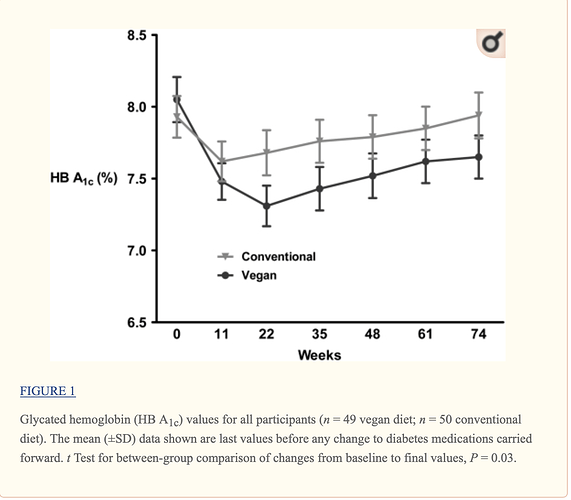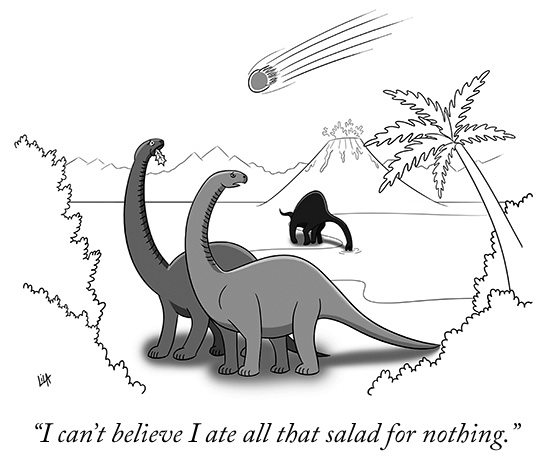I have observed online the following:
-
No matter what ‘dietary plan’ you choose, changing from the ‘see-food’ ‘standard diet’ will lead to improvements in fat loss, how they feel, etc. This leads nearly everybody to believe their eating plan is The Answer™ initially.
-
After some time, the initial results, which are the “differential” between the nearly-worst-possible diet and whatever diet plan is in question, usually mostly in ‘water and inflammation’ changes, have reached equilibrium. This is usually a few months in. By this time, everyone is sure their diet will save the world just like it’s saving them.
-
Now is when the actual test of the dietary plan and how that person is implementing it, compared to everything else in their life (from their genetics to their age, sex, activity level, environment, socioeconomic options, job/family limitations, etc.) kicks in. This isn’t just testing ‘whether’ ‘it’ ‘works’ but how well it’s being implemented for that person.
“I’m losing weight, and all my hair fell out” is a somewhat imperfect implementation, although if you began obese, any healthy diet will cause such rapid weight loss that some of that will be a result.
“I’m losing weight but I’m getting gout” (sometimes in lower carb diets) is an imperfect implementation, and a few things including supplementation and NOT drinking diet soda should probably be added.
“I’m losing weight but my teeth are rotting out or falling out” or “but I’m an emotional wreck” or “but I have major constant adult acne now” or “but I have these unexplained rashes” (all sometimes in lower fat diets) is an imperfect implementation (and don’t get me started) – I think you get the idea.
But the most likely complaint for people who began and are still fat at this point, is that they are no longer losing weight. Now I don’t just mean, not for a month or two while they get smaller despite the scale. I mean they just aren’t losing. Sometimes are even slightly gaining. Sometimes they’re to the point of eating insanely low numbers of calories and they still cannot seem to lose fat, despite that they have a whole lot of it to lose.
I think this represents a problem with whatever the person is doing, though that may not be their eating plan. It might be they have, by this point in life, genuine hormonal imbalances that might requires supplements, or even medications.
It can also be their choice of foods. This is harder for people who cook for families I suspect. But sometimes I see people’s diet journals (not here, but on another forum I frequent) and they’re like, a bit of this and that – all ‘foods’ which in even a small serving would be way too carby, but they just ate one cherry, one Triscuit, etc. and processed meats. At the end of the day yes, they made their carb goals, but for godssakes it looks like their diet was based on stealing Hors D’oeurves from a wedding they weren’t invited to.
Of course: Maybe the degree of metabolic damage means they can eat 20 carbs but not 50, at least for some more time. Maybe their primary fat is mayonnaise from soybean oil, or cream cheese, and their body has an inflammatory reaction to it no matter how few carbs it has.
Or for vegans, maybe they are nearly living on grains now, and their body is inflamed from that. Or maybe they are nearly living on fruit and starch now, and there’s so much sugar in their diet they’re heading for diabetic very quickly.
- So Person-X goes to their “dietary community” and they say, “I feel like crap, and I’m not losing weight.” And their community says, “Tell us what you are eating.” And they spell it out.
Various things can come from this:
a/ Their implementation is not ideal, or not ideal “for them,” and they’re able to get corrective advice, that with trial and error, works for them.
b/ Their diet is not ideal, or not ideal “for them,” and even when they have become the absolute Poster Child™ for DietX, they still feel crappy and aren’t losing weight.
c/ It might be that (a) is the case, but they cannot let go of food addictions and they can’t fully commit, so they don’t do the trial and error, they just decide it didn’t work for them and they tell anyone who asks, “Yeah, I did Atkins, that didn’t work for me.”
Usually, every community from keto to vegan, will then suggest, directly or indirectly, that they are probably just not doing it well enough. And sometimes they are correct… and sometimes they aren’t. Every community is filled with people who believe it’s working for THEM – after all, they wouldn’t be doing it otherwise.
But I notice a difference when it comes to low-carb versus vegan diet forums and their conversations and tendencies. Obviously these are generalities, and not “every” person, yada yada. But:
Lowcarb tends to be filled with people who are “objective biometric” freaks. They track every body measure known to man that they can afford. The fact that so many people begin eating keto or lowcarb because they are either fat or diabetic or both, adds to this, since both fat and blood sugar can be measured. Many others are very serious about their athletics, so they track because of or related to that.
On the whole, if keto or lowcarb (or how it is being implemented in context) does not work for someone, it is REALLY OBVIOUS. There is no way to generalize about it if you’re measuring your ability to squat or your blood glucose or whether your pants are looser. Either it’s working, to whatever degree, or it’s not.
Vegan tends to be filled with people who are “subjectively earnest” about it all. The fact that vegan is political-philosophical at base, diet being a secondary follow on to those, is probably a lot of the reason for that. It seems to have a much higher percentage of very young people; and of women. And of lean people who loved running and yoga and living on pasta and fruit smoothies long before they went vegan.
In the keto and low carb worlds, if you tell these groups that the diet is just not working for you, they will try to help, they may suggest you see a doctor for more insight, but most the time they figure it’s up to you and if it really isn’t working, well, you know, people are different, so maybe it’s just not for you. That’s because for many of these people, it’s just an eating plan not a religion, and they are basing results on actual measurable results, so it’s just data. Good or bad, it is what it is.
In the vegan world though, because this is a politic and philosophy – that is to say, it may as well be a religion – if you tell them it is not working for you, after initial “fix it” assistance, you are now the enemy. You are lying. And if you are fat and you say that this is not causing weight loss and is even causing weight gain, well it must be that you are lying about what you eat, you know, “like fat people do.” Any questioning of whether this “works” is a form of heresy. Are you being paid by the beef industry?
(You know what would change the mind of a lot of young women who want to be vegan because of their misleading propaganda about it making you skinny? Seeing how many women I have met over the years in low-carb areas who weigh 300++ pounds who “used to be” vegetarian or vegan. If it had worked for them, would they have ended up weighing that??)
As a result of the “social circling” in the low-fat and vegan worlds, it becomes a “self-selected community.” Every community is of course, but I mean, there is a social shunning and negative ostracization in the vegan community that is so extreme, it’s kind of impressive. It’s like the internet food version of Lord of the Flies.
This leaves the “leaders” of the communities with what? With a community that, as an absolutely amazing coincidence, only seems to be filled with people who proactively promote how well veganism works for them. Everybody else is either terrified to say otherwise or leaves the community entirely.
Contrast this with low carb and keto, where people argue over all kinds of things including eating carbs in cycles, or on weekends, or before working out, or more if you’re menopausal, or just eating meat, or eating much more fiber, or – really, aside from the “generally low in carbs most the time” bit, there’s a whole variety of opinions and approaches and constant experimentation in it.
Because it’s an eating plan, not a religion. And people differ.
But I think the nature of the low-fat and vegan communities – which greatly overlap – creates a false-positive for its “leaders,” who look out into the community and only see conformity. Oh look, all these young people, all these lean people, all these runners and yoga folks, and they all want to save the world, and this is a Higher Calling, and any other perspective on reality is an existential threat which must be stamped out like the heresy it is.
Hence, PCRM, cannot abide the fact that keto makes diabetics healthier.
PJ




